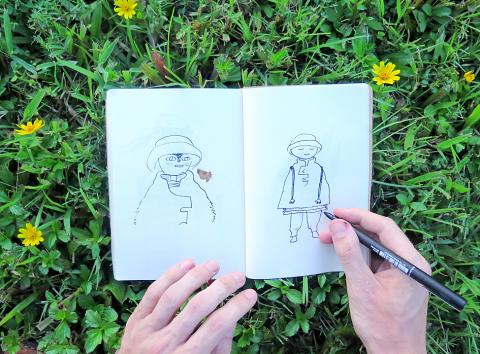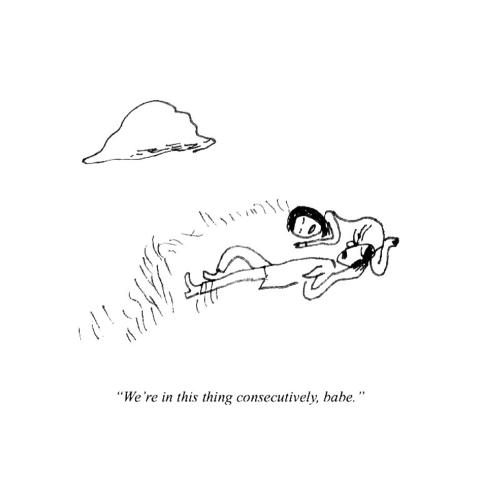Jameson Zimmer is the sort of person who finds wonder in simplicity and whimsy in the ordinary. When I tell him I grew up in the mountains of Yangmingshan (陽明山) in northern Taipei, he says it must have been “magical” — when what stands out the most in my memory, by contrast, is having to kill snakes and spiders that frequently crawled from the nearby forest into my room.
The Virginia native who currently works part-time as an instructor at Camp Taiwan, a nature camp for children in Yangmingshan, spends the rest of his time eking out a living creating cute comics, Internet art and zines. He’s also the author of the forthcoming illustrated children’s book, Bedtime in Yangmingshan.
Raised on a farm in rural Virginia by a printmaker mother and dairy herdsman father, Zimmer found his way to Taipei by fluke. After studying creative writing in college, he worked in outdoor recreation leading bicycle tours and organizing backpacking trips. Wanting to travel more, he searched for opportunities to continue working with children outdoors — and Taiwan was one of the few places outside of the US to offer that.

Photo courtesy of Moonie Tyler
Zimmer says the main themes in his art and writing are nature, childhood and melancholy. As he soon discovered, Taipei’s blend of laidback metropolitanism, combined with its unpretentious art scene and easy access to nature, would provide the perfect setting for him to hone his craft.
“The city has a quiet and refined sensibility that’s really appealing to someone who would rather spend time doing creative things at a co-working space than getting drunk at a bar,” Zimmer says.
That being said, he says he has spent countless nights pouring over art and design books in the Dunhua Eslite Bookstore (誠品) — which is open 24 hours a day — where he finds inspiration from the minimalistic graphic style of local designers such as Nieh Yung-chen (聶永真) and Wang Chih-hung (王志弘). Sharing the space with other “insomniac introverts” gave him encouragement that there were opportunities for dreamy, creative types to do well in the city.

Photo courtesy of Moonie Tyler
He adds that it’s “very cool to see people making a living screen-printing, embroidering, making zines and generally doing awesome stuff.”
SWEATY ROCKS
Zimmer’s drawings and writings dabble in light-hearted humor. His style, like his personality, is charming and whimsical rather than lofty or sarcastic. He uses phrases such as “clattering palm leaves” and “creepy bamboo thickets,” and sketches cutesy-looking comics with black ink or watercolors.

Photo courtesy of Moonie Tyler
“People definitely respond well to a light-hearted drawing style, especially here,” he says.
Despite his humble demeanor, Zimmer has managed to hone in on what makes Taiwanese audiences tick — and this shows in the characters he creates for the popular messaging app Line.
He initially started with inventing his own animated GIFs for chatting with friends in China on WeChat (a messaging app used in China) and decided one day to submit some ideas to Line.
“It’s just a question of figuring out the sort of aesthetic they like, adhering to their guidelines and waiting months on end for them to look at your designs,” Zimmer says.
Featuring two little stones in a symbiotic love-hate relationship, Sweaty Rock — Zimmer’s latest set that he’s working on for Line — is largely a commentary on his impressions of Taiwanese couple culture, notably the ups, the downs and all the hilarity in between.
The stones are “always invading personal space and trying but failing to help each other out,” he says.
In other words, they act like any couple would, thus making them extremely relatable.
UNDER THE RADAR
Quirky characters and situations can also be found in Bedtime in Yangminshan, which, as the name suggests, is a collection of bedtime stories that Zimmer made up for the children at the nature camp.
Seeing as the Taiwanese education system can be quite rigorous and stressful, Zimmer says the kids are “super lucky” to have the opportunity to be doing outdoor activities such as rock climbing and river tracing. He also created his own class called “faerie architecture” where the children make boats out of sticks, leaves and flowers.
“Being around kids in a pro-creativity environment can be really inspiring,” he says.
Although he wrote the book without the intention of having a wider audience, young readers should still be able to relate to the broader theme of nature’s wonder. Stories that tend to fare well, Zimmer says, are ones that address children as equals, and that are earnest but humorous in the sense that they allow the listener to be in on the joke.
“I had a big stake in them being effective at getting everyone sleepy, since I couldn’t sleep myself if the kids were up all night jumping around acting crazy.”
The book will also include a three-dimensional map of Yangmingshan — with some added fantastical elements.
“Getting to do ridiculous stuff like that is the silver lining in the hard work that is self-publishing,” he says.
An artist working in a nature camp who occasionally designs cartoons for messaging apps and writes children’s books might seem like an odd combination — but perhaps a setting like Taipei is most conducive for someone like Zimmer.
As Zimmer himself says, “the fact that it’s under the radar and off the beaten expat trail is part of the appeal, from my perspective.”
Making Taiwan known to the rest of the world isn’t a part of his ultimate goal, although he says that Taiwan has greatly shaped his development as an artist and writer. He also jokes that it would be nice to go to a bank in Virginia and not be handed an envelope filled with Thai Baht again (apparently there are still people who think that Taiwan and Thailand are the same country).
“It makes me think of those Portland bumper stickers — ‘Keep Portland Weird,’” Zimmer says. “I hope that Taiwan stays weird.”

Last week the story of the giant illegal crater dug in Kaohsiung’s Meinong District (美濃) emerged into the public consciousness. The site was used for sand and gravel extraction, and then filled with construction waste. Locals referred to it sardonically as the “Meinong Grand Canyon,” according to media reports, because it was 2 hectares in length and 10 meters deep. The land involved included both state-owned and local farm land. Local media said that the site had generated NT$300 million in profits, against fines of a few million and the loss of some excavators. OFFICIAL CORRUPTION? The site had been seized

Next week, candidates will officially register to run for chair of the Chinese Nationalist Party (KMT). By the end of Friday, we will know who has registered for the Oct. 18 election. The number of declared candidates has been fluctuating daily. Some candidates registering may be disqualified, so the final list may be in flux for weeks. The list of likely candidates ranges from deep blue to deeper blue to deepest blue, bordering on red (pro-Chinese Communist Party, CCP). Unless current Chairman Eric Chu (朱立倫) can be convinced to run for re-election, the party looks likely to shift towards more hardline

Sept. 15 to Sept. 21 A Bhutanese princess caught at Taoyuan Airport with 22 rhino horns — worth about NT$31 million today — might have been just another curious front-page story. But the Sept. 17, 1993 incident came at a sensitive moment. Taiwan, dubbed “Die-wan” by the British conservationist group Environmental Investigation Agency (EIA), was under international fire for being a major hub for rhino horn. Just 10 days earlier, US secretary of the interior Bruce Babbitt had recommended sanctions against Taiwan for its “failure to end its participation in rhinoceros horn trade.” Even though Taiwan had restricted imports since 1985 and enacted

Enter the Dragon 13 will bring Taiwan’s first taste of Dirty Boxing Sunday at Taipei Gymnasium, one highlight of a mixed-rules card blending new formats with traditional MMA. The undercard starts at 10:30am, with the main card beginning at 4pm. Tickets are NT$1,200. Dirty Boxing is a US-born ruleset popularized by fighters Mike Perry and Jon Jones as an alternative to boxing. The format has gained traction overseas, with its inaugural championship streamed free to millions on YouTube, Facebook and Instagram. Taiwan’s version allows punches and elbows with clinch striking, but bans kicks, knees and takedowns. The rules are stricter than the